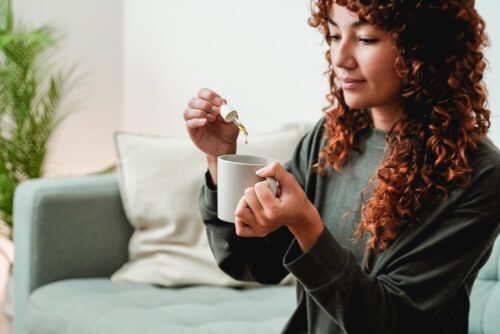Does CBD Help with Anxiety? A Simple Explainer
Anxiety has many pharmaceutical treatments, but not all of them are as effective as people expect. It’s why so many people are now turning to alternative therapies like CBD. There are a lot of questions circling around — like “how long does CBD oil take to work for anxiety?”, but not a lot of answers.
Unsurprisingly, there is a lot of confusion out there. So it’s time to clear it up with a simple explainer on straight hemp CBD oil and anxiety.
What Is Anxiety?
Everyone experiences anxiety in some form or another. It’s that nervous feeling before you need to give a presentation or start a new job. This anxiety is normal, it’s a natural aspect of everyday life.
However, you may have an anxiety disorder if your anxiety:
- Becomes persistent
- Lasts for at least six months
- Interferes with your quality of life
Common anxiety symptoms include:
- Overthinking
- Feeling tense, nervous, or restless
- Hyperventilating
- Trouble sleeping and insomnia
- Difficulty concentrating
Anxiety disorders, like general anxiety disorder (GAD), separation anxiety disorder, and social anxiety disorder (SAD), are the most common mental disorders. They affect more than 30 percent of American adults, while four percent of the worldwide population suffers from anxiety disorders, according to 2019 data.
The World Health Organization reports that the numbers have dramatically increased (by 25 percent) since the pandemic’s start. Worried and afraid, people are seeking alternatives to pharmaceuticals.
What Is CBD?
Cannabidiol (CBD) is one of the main chemicals found in marijuana and hemp plants.
Fun fact: There are more than 100 cannabinoids in cannabis sativa plants, of which CBD and THC are the most well researched.
Unlike its intoxicating tetrahydrocannabinol (THC) cousin and other cannabinoids, CBD isn’t psychoactive and won’t make you high. It’s also well tolerated with few side effects and is non-toxic to people.
How Does CBD Work?
In short, cannabinoids interact with your endocannabinoid system (ECS). Unlike THC, which interacts directly with the cannabinoid receptors, CBD indirectly stimulates your ECS to make its own cannabinoids.
To enhance your mood, CBD binds to a serotonin receptor, a chemical messenger that induces antidepressant and antianxiety effects.
Does the Research Support CBD for Anxiety?
CBD is nearing a cult-like status these days, with the compound hailed as an almost cure-all.
What does the research say, though? Does CBD really relieve anxiety?
Research is still in its early stages, but evidence of CBD’s effects on alleviating anxiety and other mood disorders is encouraging. Promising — but not proven yet.
For example, a 2011 small-trial study showed that CBD reduced discomfort and anxiety in people with social anxiety disorder during public speaking.
Four years later, a review of almost 50 studies concluded that CBD helps with various anxiety disorders, like SAD, GAD, and panic disorder.
A 2018 review published in the Frontiers in Immunology found that CBD has a calming effect on the participants’ brains. Another study in 2019 noted that 80 percent of the participants experienced improved anxiety and 70 percent slept better when treated with CBD.
More recently, a 2021 review published in the Journal of Cannabis Research asked nearly 400 past and current CBD users to answer an online survey. The survey found that the users take low-dose CBD to manage self-perceived anxiety, sleep, and stress.
How To Use CBD for Anxiety
CBD isn’t a legal anxiolytic (medication to relieve anxiety) — yet. So, with the promising research results and lots of anecdotal evidence that CBD works for anxiety sufferers, how can you use CBD to help you?
CBD is available in various forms, from oils, tinctures, capsules, and vapes to gummies, flowers, sprays, creams, and gels. Because it’s derived from hemp, CBD is legal in the US.
What’s the Best CBD Dosage for Anxiety?

There’s no recommended CBD dosage to help you deal with anxiety.
It’s best to start with a low dose, see how your body reacts, and then up the dosage as needed. You may find that a CBD dose as low as 25-75 milligrams helps, while many scientific studies use upwards of 300 milligrams.
The safest way to determine your own level is to start with the lowest suggested dose, and slowly increase that dose every few days. Take it slow, and monitor your mood or any side effects.
How Long Does CBD Oil Take to Work for Anxiety?
It takes roughly 30 minutes to 2 hours for orally administered CBD, like oil, capsules, or edibles, to start working.
Many people report that the true effects of CBD are only apparent after several days of use. Almost as if the effects are building up strength in the mind and body.
Of course, there aren’t scientific studies confirming these reports — but it’s worth considering if you are waiting for the effects to kick in. Maybe add CBD into your daily routine for a week to get a true sense of the ongoing effects.
Try Clean Beauty & Wellness’ CBD Tincture
To calm your mind consider our CBD Tincture that’s made from organically grown hemp. This one-ounce (30 ml) bottle with 50 servings contains 1,000 mg of high-potency pure CBD oil.
Shake the bottle and place 24 drops (0.6 ml) under your tongue twice a day. Hold the drops for five to 10 seconds before swallowing.
As mentioned, it’s best to start with lower than the recommended dosage for several days and monitor your symptoms.
Don’t Forget About Making Other Lifestyle Changes
Consider other lifestyle changes to help you manage your anxiety, like:
- Prioritizing sleep
- Getting active
- Eating healthy
- Meditating
- Journaling
- Reducing alcohol and caffeine intake
- Doing yoga or Pilates
- Learning breathing techniques
- Self-caring
- Maintaining a positive outlook
Wave Goodbye to Anxiety with Straight Hemp CBD Oil
While research is still in its infancy, straight hemp CBD oil or CBD edible has become the go-to for anxiety sufferers as an alternative option. So while we can tentative give answers for questions like “How long does CBD oil take to work for anxiety?” we always recommend speaking with a mental health professional for deeper insights.

